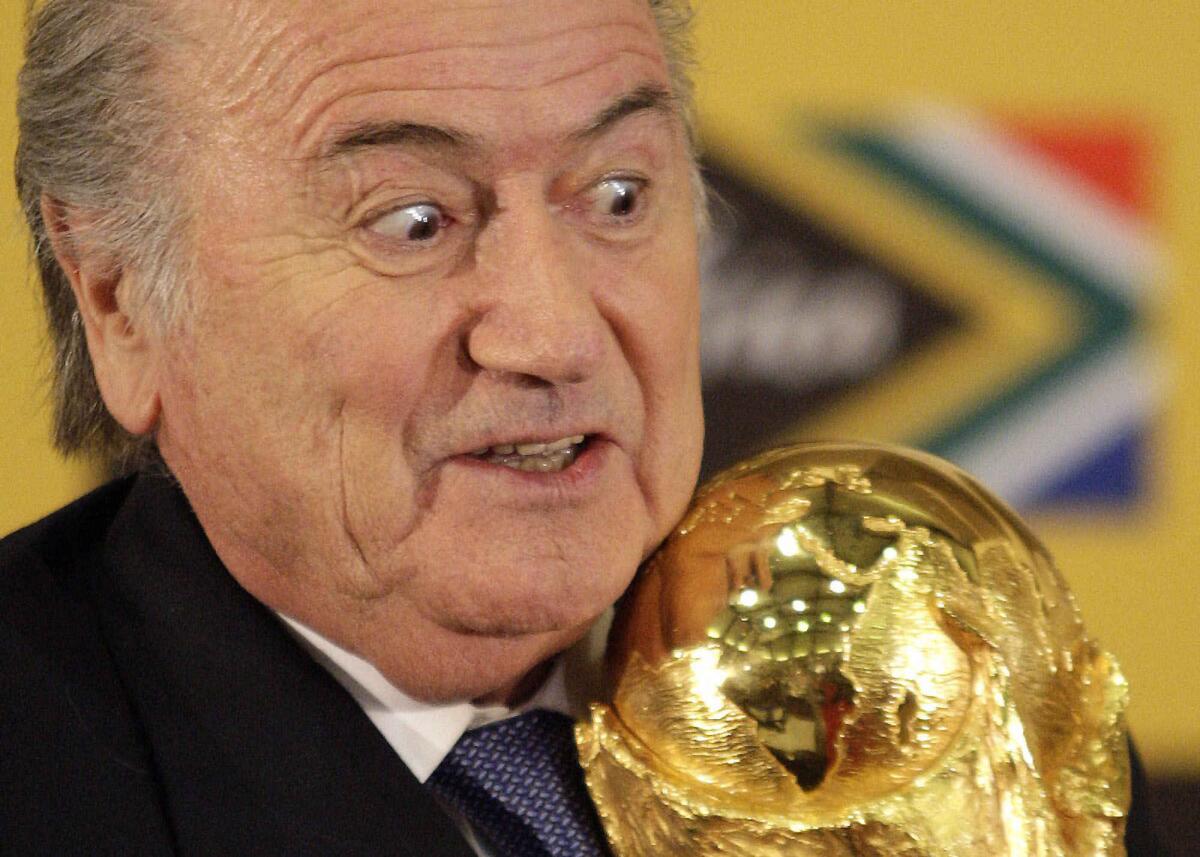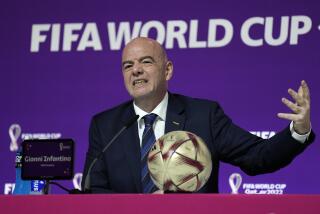The rise and fall of FIFA President Sepp Blatter

- Share via
With his resignation Tuesday morning, Sepp Blatter will leave the organization he has led for almost 17 years. Throughout his time at FIFA, he weathered nearly constant accusations of corruption, but also spread the game to developing countries around the globe.
Blatter has been involved in sports his entire life — from the age of 4 when he first took up soccer, through his early career as head of the Swiss Ice Hockey Federation, as well as his involvement in organizing the 1972 and 1976 Olympic Games.
His rise to power in FIFA started in 1975, when he was named technical director. Just six years later, he was promoted to secretary-general, the second-highest position in the organization, under president Joao Havelange. It is Blatter’s own secretary-general, Jerome Valcke, who is under investigation for a potential $10-million bribe that has become the focus of the corruption scandal.
Blatter was elected as president for the first time in 1998 with a platform centered around pushing soccer beyond the traditional strongholds of South America and Europe and into Africa and Asia. Within a year, however, British reporter David Yallop released a book accusing Blatter of spending $1 million to bribe top officials and secure votes. Blatter not only refused to open an inquiry into the accusations, he also attempted to block sales of the book in the Netherlands.
High-ranking officials, including the vice president of the African Football Confederation Farah Addo and Lennart Johansson, president of Europe’s governing body UEFA, continued to accuse Blatter of corruption, saying he and those closest to him bungled finances, made bribes and indulged in cronyism. Despite these claims, Blatter was reelected by a wide margin in 2002, ran unopposed in 2007 and won a fourth term in 2011 when his only opponent, former ally Mohammed bin Hammam, withdrew a week before the election due to allegations of bribery. Blatter later banned bin Hammam from soccer for life.
In the run-up to the 2002 election, then-Secretary-General Michel Zen Ruffinen, also a former friend of Blatter, released a file which detailed financial mismanagement within FIFA that led to losses of almost $100 million during Blatter’s tenure. Swiss authorities cleared Blatter of any wrongdoing, and he then removed Zen-Ruffinen from office before the World Cup.
Blatter continued to succeed in elections due to strong support from the African and Asian countries he made the heart of his campaign in each cycle. Under his leadership, both continents hosted their first ever World Cups (2002 in Japan and South Korea, 2010 in South Africa), and they each expanded their own regional tournament slate.
More recently, Blatter has been connected to two different scandals in the last three years. In 2013, he was declared innocent by a FIFA ethics commission into illegal payments to executives from 1992-2000. His predecessor Havelange, however, was found to have accepted bribes and resigned as honorary president.
Two days before the 2015 presidential election, U.S. officials arrested seven high-ranking FIFA officials and executives on corruption charges related to fraud and bribery in the 2011 election and other decisions. Furthermore, an ethics probe commissioned by FIFA showed there was evidence suggesting bribes influenced the selection of the locations for the 2018 and 2022 World Cups.
Despite the controversy, as well as opposition from UEFA and the U.S. Soccer Federation, Blatter won a fifth term May 29, defeating reform candidate Prince Ali bin Hussein of Jordan, once again with the backing of most Asian and African countries.
Four days later, Blatter announced he would resign from office as soon as a new, extraordinary election could be held.
More to Read
Go beyond the scoreboard
Get the latest on L.A.'s teams in the daily Sports Report newsletter.
You may occasionally receive promotional content from the Los Angeles Times.










